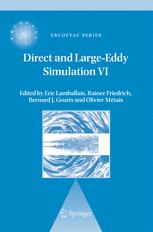

Most ebook files are in PDF format, so you can easily read them using various software such as Foxit Reader or directly on the Google Chrome browser.
Some ebook files are released by publishers in other formats such as .awz, .mobi, .epub, .fb2, etc. You may need to install specific software to read these formats on mobile/PC, such as Calibre.
Please read the tutorial at this link: https://ebookbell.com/faq
We offer FREE conversion to the popular formats you request; however, this may take some time. Therefore, right after payment, please email us, and we will try to provide the service as quickly as possible.
For some exceptional file formats or broken links (if any), please refrain from opening any disputes. Instead, email us first, and we will try to assist within a maximum of 6 hours.
EbookBell Team

5.0
98 reviewsThe sixth ERCOFTAC Workshop on ‘Direct and Large-Eddy Simulation’ (DLES-6) was held at the University of Poitiers from September 12-14, 2005. Following the tradition of previous workshops in the DLES-series, this edition has reflected the state of the art of numerical simulation of transitional and turbulent flows and provided an active forum for discussion of recent developments in simulation techniques and understanding of flow physics. At a fundamental level this workshop addressed numerous theoretical and physical aspects of transitional and turbulent flows. At an applied level it contributed to the solution of problems related to energy production, transportation and the environment.
Since the prediction and analysis of fluid turbulence and transition continues to challenge engineers, mathematicians and physicists, DLES-6 covered a large range of topics, from the more technical ones like numerical methods, initial and inflow conditions, the coupling of RANS and LES zones, subgrid and wall modelling to topics with a stronger focus on flow physics such as aero-acoustics, compressible and geophysical flows, flow control, multiphase flow and turbulent combustion, to quote only a few.
The present proceedings contain the written versions of 7 invited lectures and 82 selected and reviewed contributions which are organized in 16 parts entitled Turbulent Mixing and Combustion; Subgrid Modelling; Flows involving Curvature, Rotation and Swirl; Free Turbulent Flows; Multiphase Flows; Wall Models for LES; Complex Geometries and Boundary Conditions; Flow Control; Heat Transfer; Aeroacoustics; Variable Density Flows; Inflow/Initial conditions; Separated/Reattached Flows; Hybrid RANS-LES Approach; Compressible Flows; and Numerical Techniques and POD.